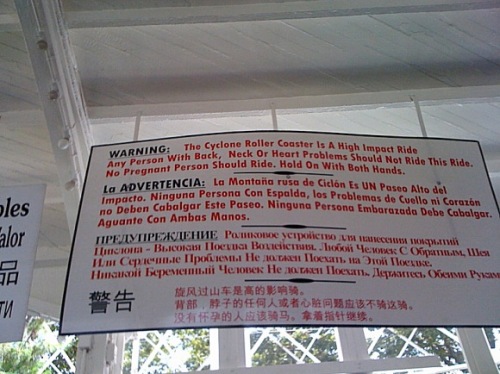Quadrilingual Garbage
This notice on the window of a shop selling a very special type of life-extending egg in Hakone, Japan vies for the worst signage translation we've ever seen.
Read the rest of this entry »
This notice on the window of a shop selling a very special type of life-extending egg in Hakone, Japan vies for the worst signage translation we've ever seen.
Read the rest of this entry »
If you know your modern East Asian history at all well, the name Sun Yat-sen (1866-1925) will be familiar to you as that of the man chiefly responsible for the overthrow of the last imperial dynasty, the Manchu Qing, and the father of the Republic of China. Like most Chinese with any pretensions to cultural dignity, Sun Yat-sen has many names (the renowned 20th-century author Lu Xun had over a hundred). His real (genealogical) name was Sūn Démíng 孫德明 (Sun Virtue-Bright). Sun Yat-sen, the name by which he is best known in English, is actually derived from the Cantonese pronunciation of one of his pseudonyms, 逸仙 (Leisurely Immortal; pronounced Yìxiān in Modern Standard Mandarin). Most ironically, the name by which he is best known in China, Zhōngshān 中山 (Middle Mountain) is based on his Japanese name, Nakayama Shō 中山樵 (Woodcutter Nakayama).
Read the rest of this entry »
Reader JL sent in a pointer to this wonderful picture from the blog The Thought Experiment:

Read the rest of this entry »
The June 28, 2010 issue of the ACA Compliance Group newsletter, called ACA Insight ("The weekly news source for investment management legal and compliance professionals"), has at the top of its title page the following two sentence quotation: "There is no word in Japanese for compliance. That's a problem." On the following page, there is a brief article entitled "A Few Thoughts on Foreign Offices," the third section of which reads as follows:
Third, local custom can also present barriers to compliance. "There is no word in Japanese for compliance," said the CCO [VHM: Chief Compliance Officer], '[t]hat's [VHM: sic] a problem." It is very difficult, for example, to get office staff to submit statements for personal trading reviews, and when you do finally get them, they're not in English. Hire a native speaker for the home office to assist with translations and communication, the CCO advised. It is absolutely necessary for a good compliance program.
Read the rest of this entry »
On a Chinese site selling paint, pharmaceutical products, paper industry additives and so forth, we find the colorful Chinglish phrase "fuck the empress." Although the "f" word occurs fairly frequently on this site, the exact citation for the sensational "fuck the empress" is the 14th bulleted item about three quarters of the way down on this page: "Spray to inunction the partition slightly treat to fuck the empress to with the Beat to whet."
Read the rest of this entry »
In an Op-Ed piece for the New York Times published on May 14 ("Search Engine of the Song Dynasty"), Ruiyan Xu laments that Baidu (Roman letter name of the popular Chinese search engine ["the Chinese Google"]) is not as meaningful as 百度 ("hundred times," pronounced Bǎidù), which was taken from a poem written more than eight centuries ago about persistent searching amidst chaos ("Search Engine of the Song Dynasty", 5/14/2010):
BAIDU.COM, the popular search engine often called the Chinese Google, got its name from a poem written during the Song Dynasty (960-1279). The poem is about a man searching for a woman at a busy festival, about the search for clarity amid chaos. Together, the Chinese characters băi and dù mean “hundreds of ways,” and come out of the last lines of the poem: “Restlessly I searched for her thousands, hundreds of ways./ Suddenly I turned, and there she was in the receding light.”
Baidu, rendered in Chinese, is rich with linguistic, aesthetic and historical meaning. But written phonetically in Latin letters (as I must do here because of the constraints of the newspaper medium and so that more American readers can understand), it is barely anchored to the two original characters; along the way, it has lost its precision and its poetry.
Read the rest of this entry »
In the July 12 & 19 issue of The New Yorker, there’s a nice little piece by Ben McGrath called “Spy vs. Spy: Say What?” that starts out, “Count linguists and phonologists among those bewildered by last week’s Russian spying scandal, in which the F.B.I. arrested a network of presumed Muscovite spooks who appeared to be living ordinary American lives, gardening and Facebooking and selling real estate under assumed identities.” (Never mind the problematic presupposition signaled by the conjunction ‘linguists and phonologists’.) Only an abstract of the article is in the accessible online issue, here. For the full article you need hard copy or a subscription to the digital online version.
The linguistic issue is that one of the spies explained her accent by saying she was Belgian, and another by declaring herself to be Québécois. Maria Gouskova, a UMass Ph.D. now an assistant professor at NYU and a specialist in Russian phonology, gets extensively quoted and does the profession proud, including showing that linguists and phonologists can have a sense of humor; and Ben McGrath seems to have done a fine job of writing it up, also with good quotes from Stephanie Harves and Joshua Fishman.
Read the rest of this entry »
OK, I'm intrigued now. I have always thought Albanian seems like a fascinating language (Indo-European, yet so isolated that it was a hundred years before comparative linguists realized that), and now Arnold Zwicky has discovered that my surname is a word in Albanian. I don't think he's right about it being a given name; here's an instance of it in a poem, apparently on a poetry forum, without an initial capital:
. . .
edlira mi goc e vogel
kur vjen nforum gushen si pullum
i mer temat mare e mare
sle teme dashnie pa e pare
. . .
And it turns up uncapitalized on this page as well (cun cun gush pullum i ka fal zoti cunat, it says). So, lacking an Albanian dictionary, I'm appealing for an Albanian-competent Language Log reader out there in Internetia: Please tell me, what does my name mean in Albanian?
Paul Bickart has called my attention to the latest issue (June 23, 2010) of New Scientist which has, in its "Feedback" column, a frustrated discussion of what seems to be a strange translation from Chinese:
Read the rest of this entry »
BP's chairman Carl-Henric Svanberg has been taken to task for a statement he made to reporters after a meeting with President Obama and other White House officials: "I hear comments sometimes that large oil companies are really companies that don’t care, but that is not the case in BP, we care about the small people."
The Economist's new language blog Johnson chalks up Svanberg's unfortunate wording to his lack of fluency in English, suggesting that he "may have heard a venerable American phrase, 'the little guy,' and tried to use it, simply misremembering slightly." On Talking Points Memo, Josh Marshall speculates that "the small people" was the result of a "phrase in Swedish he might have been carrying over into English." And indeed, BP spokesman Toby Odone told the Associated Press that "it is clear that what he means is that he cares about local businesses and local people. This was a slip in translation."
Around the blogosphere, Swedish speakers have further explained "the small people" as a translation of the phrase "den lilla människan." There's a bit of disagreement, however, about how condescending that phrase might be in Swedish.
Read the rest of this entry »
Over the years, here at Language Log we've examined countless examples of Chinglish, that inimitable brand of English spewed out by bad translation software and incompetent human translators. The mirror of this phenomenon going in the other direction has been referred to as Zhonglish, which is defined in the Urban Dictionary as "The mangled, garbled, butchered, malapropriated or trashed Chinese spoken by native speakers of English."
I touched upon Zhonglish briefly last year ("Xinhua English and Zhonglish", 2/4/2009), but now (on a Chinese social networking site) I've come across a wonderful example of written Zhonglish that merits more extensive discussion — the multilingual warning sign at the entrance to the world-famous roller coaster known as the Coney Island Cyclone:

Read the rest of this entry »
From Don Snow:
====
This from a sign in a Nanjing subway station directing people to important places:
中共省委党校
Commie Academy of Provinial (sic) Committe of Chinese Communist Party
I can see why they wanted to shorten the English translation a bit, but still….Commie?
====
Read the rest of this entry »